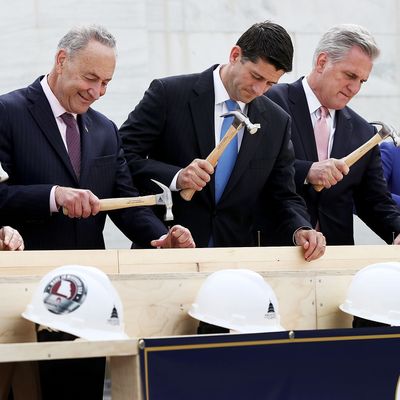
As Democrats mull the possibility of offering some sort of limited cooperation with President-elect Donald Trump, they should be thinking about a minimum price for the rather important concession of “normalizing” the man through bipartisanship. Looking ahead, there is a legislative locomotive getting ready to leave the station in Washington which is so powerful and destructive that side-tracking it would be an enormous prize for Democrats — one big enough that it might even be worth cooperating with Trump on infrastructure spending or trade agreements.
The locomotive in question is a “reconciliation bill” likely incorporating the main features of Paul Ryan’s budget — such as enacting big high-end tax cuts, disabling Obamacare, defunding Planned Parenthood, decimating Great Society anti-poverty programs, dumping Medicaid on the states, maybe even voucherizing Medicare. It certainly won’t take long to put together; plans for a similar bill were actually in the works four years ago in case Mitt Romney won; and congressional Republicans did a dry run last year, which hardly anyone noticed because President Obama vetoed it. Just a few weeks ago Speaker Ryan told the whole world he was planning such a bill again, calling it a “bazooka in my pocket.” And the reason it is so scary? Using the budget process to package such a massive bill means it could be whipped through Congress quickly on party-line votes and could not be filibustered in the Senate. Republicans could pack some huge changes into the bill, and Democrats would have very little opportunity to fight it.
Indeed, the speed with which a reconciliation bill might be enacted has been significantly enhanced by the failure of Congress to finalize a budget for fiscal year 2017, which began on October 1. (The new Congress in January can do so, and then immediately pass a reconciliation bill instead of waiting for the fiscal year 2018 budget measures, which are still a few months away.) So if Republicans can stay united they can enact two reconciliation bills in 2017 as vehicles for wide-ranging legislation.
But for this plan to work the Trump administration has to go along with it, and so far he and his people have been talking as though they expect Congress to enact his agenda on a bill-by-bill basis, not through some monstrous, impossible-to-stop reconciliation package with hundreds of nasty little surprises and interest-group goodies nestled in its fine print.
So Demand One for Democrats in exchange for doing anything other than treating Donald Trump exactly the way Republicans treated Barack Obama is for Trump to tell Paul Ryan and Mitch McConnell he is not onboard with the kind of fast-track omnibus approach to enacting a Beltway Republican wish list. For Democrats, there’s great opportunity in fighting battles one by one, over taxes and spending and Obamacare and Medicare. And with some key Senate Republicans refusing to support plans to kill the filibuster, Senate Democrats might actually have some serious leverage over both Trump and the congressional GOP.
Why, you might ask, would Trump even consider agreeing to this condition for Democratic cooperation? Well, if you believe even a fourth of the rhetoric he offered during the long presidential campaign of 2016, he doesn’t trust Ryan and McConnell and Co. as far as he can throw them, and does not share their priorities. And with all the struggles he is facing during the transition to office, the last thing he and his people are equipped to do is to force their way into the congressional boiler room where a reconciliation bill is currently being put together to figure out what should stay or go.
So maybe Democrats and the White House have a common interest in slowing things down. And if not, then Democrats have every reason to adopt a position of total noncooperation, as my colleague Jonathan Chait has suggested. After all, it is hard to imagine anything Trump could do with Democratic support that would even come close to matching in impact the speedy enactment of the Ryan budget. So that should be an absolute deal breaker for Democrats.






























